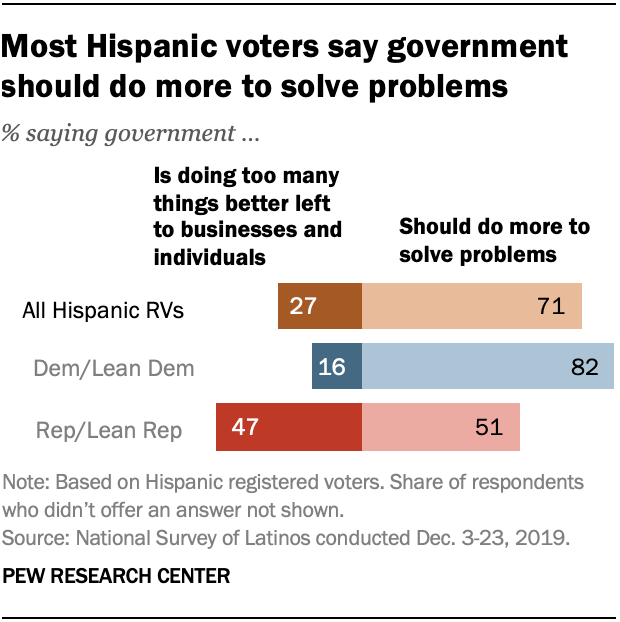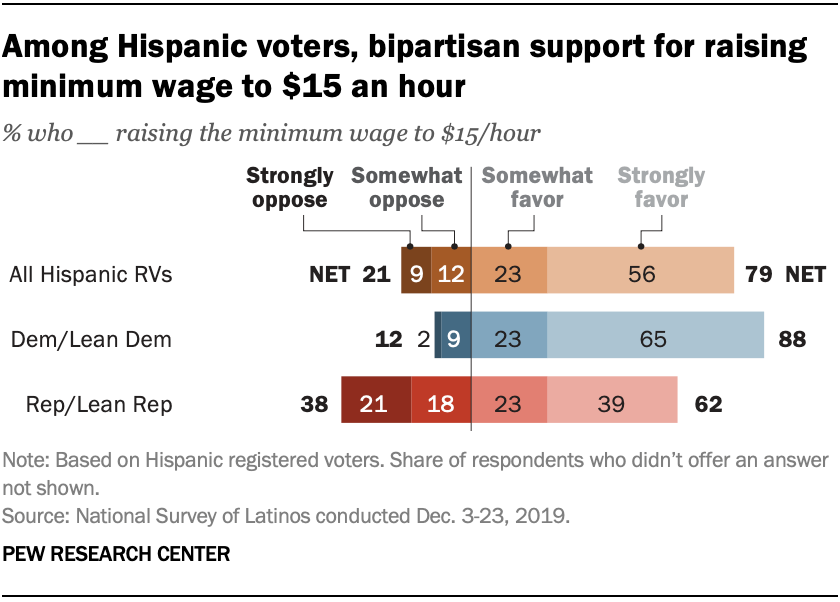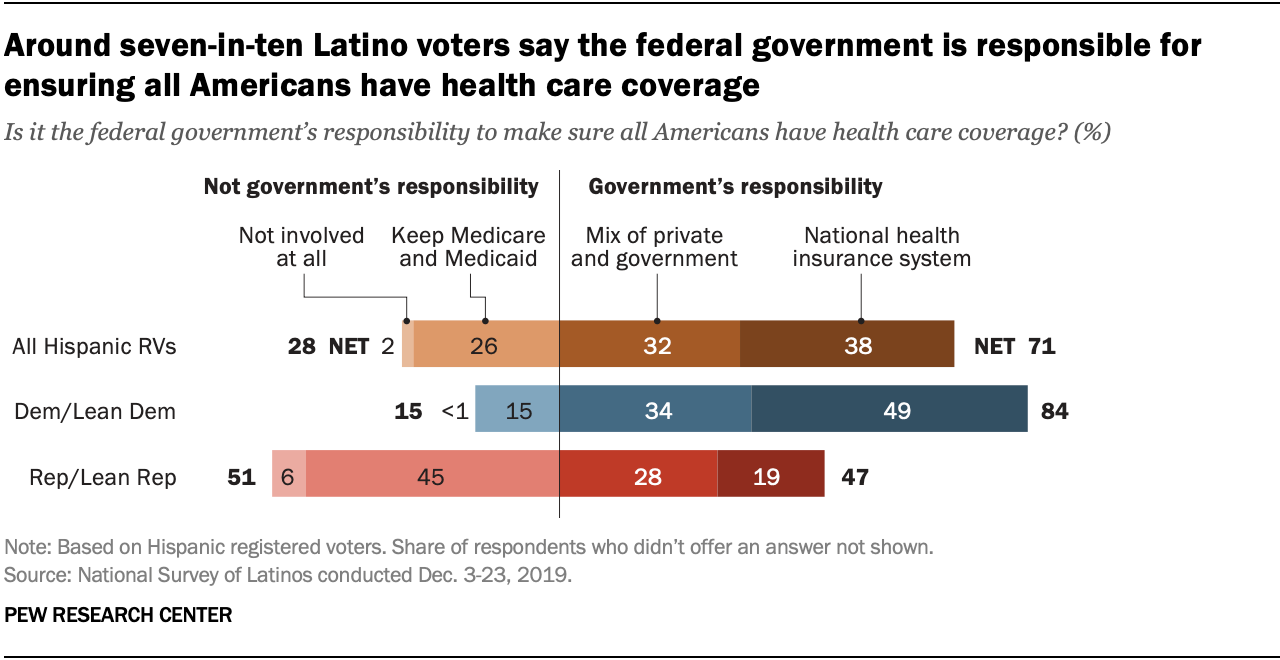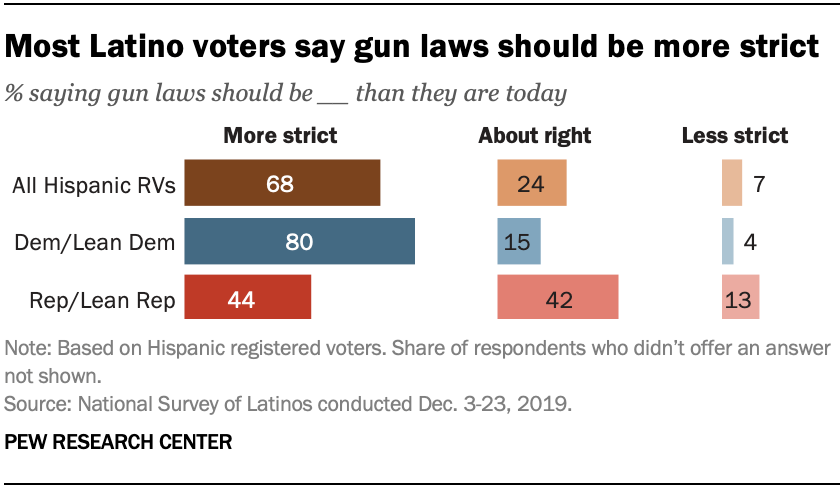 Most Latino registered voters say they want government to be more involved in solving the nation’s problems, a view that is reflected in their broad support for raising the minimum wage, government involvement in health care and stricter gun laws, according to a national Pew Research Center survey of Latino adults conducted in December.
Most Latino registered voters say they want government to be more involved in solving the nation’s problems, a view that is reflected in their broad support for raising the minimum wage, government involvement in health care and stricter gun laws, according to a national Pew Research Center survey of Latino adults conducted in December.
A record 32 million Latinos are projected to be eligible to vote in November’s general election, exceeding the number of black eligible voters for the first time. About 62% of Latino registered voters identify with or lean toward the Democratic Party, while 34% affiliate with or lean to the Republican Party.
Most Hispanic voters (71%) say the government should do more to solve problems, while 27% say government is doing too many things better left to businesses and individuals.
Hispanic Democratic and Republican registered voters have sharply different views on the role of government, though the gap is not as wide as it is among the broader U.S. public. Among Hispanic voters, 82% who identify with or lean toward the Democratic Party say the government should do more to solve problems, compared with 51% of those who affiliate with or lean toward the GOP.
For this analysis we surveyed 3,030 U.S. Hispanic adults in December 2019. This includes 2,094 Hispanic adults who were members of Pew Research Center’s American Trends Panel (ATP), an online survey panel that is recruited through national, random sampling of residential addresses. It also includes an oversample of 936 respondents sampled from Ipsos’ KnowledgePanel, another online survey panel also recruited through national, random sampling of residential addresses.
Data on the U.S. public comes from surveys also conducted on the ATP in May 2019 and September 2019. Recruiting panelists by phone or mail ensures that nearly all U.S. adults have a chance of selection. This gives us confidence that any sample can represent the whole population (see our Methods 101 explainer on random sampling), or in this case the whole U.S. Hispanic population.
To further ensure that this survey reflects a balanced cross-section of the nation’s Hispanic adults, the data is weighted to match the U.S. Hispanic adult population by gender, nativity, Hispanic origin group, education and other categories. Read more about the ATP’s methodology. Here are the questions used for our survey of Hispanic adults, along with responses, and its methodology.
 Among the U.S. public, about half of registered voters (52%) said in a September 2019 survey that the government should do more to solve problems, including 79% of Democratic voters and 22% of Republican voters.
Among the U.S. public, about half of registered voters (52%) said in a September 2019 survey that the government should do more to solve problems, including 79% of Democratic voters and 22% of Republican voters.
On the minimum wage, a large majority of Hispanic voters (79%) say they favor raising it to $15 an hour, including more than half (56%) who say they strongly favor this change. Majorities in both parties favor raising the minimum wage, though Hispanic Democrats are much more likely than Hispanic Republicans to do so (88% vs. 62%, respectively).
By comparison, 65% of U.S. registered voters said in a May 2019 survey that they favored raising the minimum wage to $15 an hour, including 90% of Democratic voters and 36% of Republican voters.
In 2019, 61% of Hispanic hourly workers earned $15 or less an hour, compared with 53% of all U.S. workers, according to a Pew Research Center analysis of Census Bureau data. Hispanic workers have seen their median personal incomes bounce back from the Great Recession, though whites and Asians have seen a stronger recovery. The unemployment rate for Latinos has been at or near record lows in recent years.
Hispanic views on health care
Hispanic voters generally believe the U.S. government should play a role in providing health care to Americans. About seven-in-ten (71%) say it is the federal government’s responsibility to make sure all Americans have health care coverage, including 38% who favor a national health insurance system and 32% who prefer a mix of private and government health care coverage. Around a quarter (28%) say it is not the government’s responsibility to make sure all Americans have health care coverage, though most in this group say they prefer to keep Medicare and Medicaid.

Hispanic Democrats and Republicans have different views on the role government should play in providing health coverage. About eight-in-ten Hispanic Democratic voters (84%) say it is the government’s responsibility to ensure Americans have health care, with 49% supporting a national health insurance system. Meanwhile, about half (51%) of Hispanic Republican voters say it is not the government’s responsibility to ensure universal coverage, though most in this group prefer to keep Medicare and Medicaid.
When it comes to the broader U.S. public, 57% of U.S. registered voters said in September that the government is responsible for ensuring health care coverage, including 87% of Democratic voters and 24% of Republican voters.
In 2018, 17.8% of Hispanics lacked health insurance, more than double the share among the broader U.S. public (8.5%), according to estimates from the Current Population Survey. The uninsured rate rose more for Hispanics than it did for any other major racial or ethnic group in 2018.
Latino views on guns
 Around seven-in-ten Hispanic voters (68%) say gun laws should be stricter than they are today, while 24% say current gun laws are about right. Only 7% say gun laws should be less strict. The survey was conducted several months after a mass shooting in El Paso, Texas, involving a suspect who said he targeted Mexicans.
Around seven-in-ten Hispanic voters (68%) say gun laws should be stricter than they are today, while 24% say current gun laws are about right. Only 7% say gun laws should be less strict. The survey was conducted several months after a mass shooting in El Paso, Texas, involving a suspect who said he targeted Mexicans.
Among Hispanic Democratic voters, 80% say gun laws should be stricter. Hispanic Republican voters are more evenly divided, with 44% saying gun laws should be stricter and 42% saying gun laws are about right.
Among the U.S. public, 59% of registered voters said in September that gun laws should be stricter, including 89% of Democratic voters and 27% of Republican voters.
A 2017 Pew Research Center survey found white Americans are more than twice as likely as Hispanics to report having a gun in their household (49% vs. 21%), while 32% of black adults said the same. In the same survey, 42% of Hispanics said they knew someone who had been shot, a similar share to whites (43%). Meanwhile, 57% of black Americans said this.
Note: Here are the questions used for this report, along with responses, and its methodology.




